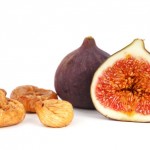Figs belong to a species of flowering plants in the mulberry family called the common fig. Figs are native to the Middle East and western Asia, and are very popular all over the world, both for its fruit and as an ornamental plant.
Interestingly, figs mature into fruits from inverted flowers. Matured flowers bloom inside the skin structure, called a syconium. These inverted flowers later form the flesh of the fig fruit. Hence, the flowers are never seen. Fig trees are used for ornamental purposes because they emit a pleasant, woodsy-green fragrance and the distinct shape of its leaves. The dried leaves of fig trees are also used in perfumes and/or in potpourri in several homes.

Image source: Pixabay, under Creative Commons License
Figs are a prominent element in the Mediterranean diet, which is considered one of the healthiest diets in the world. Figs are rich in dietary fiber, along with numerous other essential vitamins and minerals. Figs have a sweet, juicy flesh, crunchy seeds, and a tender skin, which also makes them highly perishable. Therefore, they are commonly dried to preserve them for long periods of time. Surprisingly, once dried, figs are known to be more beneficial than when consumed fresh.
Suggested read: All you need to know about the numerous health benefits of cashew nuts
History of figs
Figs have been around from as far back as 9400BC, found in the early Neolithic village Gilgal I in the Jordan Valley. These are one of the first plants ever to be cultivated by humans. Figs were common in the Roman empire too. From Afghanistan to Portugal, figs were cultivated in abundance, including in the Kumaon hills of India. Gradually, it spread to Northern Europe and the New World in the 15th century. Later, in the 16th century, Cardinal Reginald Pole introduced fig trees in London. It was only in the second half of 18th century that figs made their way to California, thanks to Spanish missionaries.
Nutritional facts of figs

Image source: Google, copyright-free image under Creative Commons License
Raw figs are high in dietary fiber, but otherwise lack any significant supply of essential nutrients. However, dried figs are a powerhouse of vital nutrients, including dietary fiber. Figs also contain many phytochemicals, including polyphenols such as chlorogenic acid, syringic acid, gallic acid, catechin, epicatechin, and rutin.
100g of raw figs provide just about 74kcal of energy, along with:
- 19g of carbohydrates
- 16g of natural sugars
- 3g of dietary fiber
- 3g of fat
- 7g of proteins
- Vitamin B6 – 9% of daily value
- Vitamin B5 – 6% of daily value
- Vitamin B1 – 5% of daily value
- Vitamin B2 – 4% of daily value
- Vitamin K – 4% of daily value
- Folate – 2% of daily value
- Vitamin C – 2% of daily value
- Manganese – 6% of daily value
- Magnesium – 5% of daily value
- Potassium – 5% of daily value
- Calcium – 4% of daily value
- Iron – 3% of daily value
- Zinc – 2% of daily value
The same quantity of 100g of dried figs provide 249kcal of energy, along with:
- 9g of carbohydrates
- 8g of dietary fiber
- 3g of proteins
- 9g of fat
- Vitamin K – 19% of daily value
- Vitamin B6 – 6% of daily value
- Vitamin B1 – 6% of daily value
- Vitamin B2 – 5% of daily value
- Manganese – 26% of daily value
- Potassium – 19% of daily value
- Magnesium – 17% of daily value
- Calcium – 16% of daily value
- Copper – 14% of daily value
- Iron – 11% of daily value
- Phosphorus – 7% of daily value
- Zinc – 4% of daily value
Health benefits of figs
Figs are high in many essential nutrients that are beneficial for your health, especially to a number of bodily systems. Figs are an excellent snack option because they are healthy and contain vitamins and minerals. So let’s take a look at some of the main health benefits of figs:
1. Figs contain powerful antioxidants.
Oxidative stress causes damage to almost all body systems, and this is caused by free radicals. Antioxidants are essential to fight off free radicals successfully. Else, oxidation is linked to many diseases, including cancer and aging. Figs, which are high in antioxidants, help stave off these health conditions.
Most types of figs have high content of polyphenols, which are essential in fighting off oxidative stress. These vital compounds are present in the fruit, pulp, skin, and leaves. In fact, dried figs are known to contain higher amount of phenolic compounds and thereby have elevated levels of antioxidant properties than their raw counterparts.
Suggested read: All the numerous health benefits of raisins
2. Figs are anti-cancer.

Image source: Google, copyright-free image under Creative Commons License
Figs have been associated in traditional medicine as a natural cure for cancer. Although very few studies suggest this and more research is needed, figs are recommended as a dietary regularity nonetheless because of the many important compounds that are anti-cancer.
3. Figs help treat common illnesses.
Figs have been known to treat a wide variety of common ailments for hundreds and thousands of years. In fact, many ailments connected to the endocrine, reproductive, respiratory, and digestive systems have been treated with fig fruit, fig extracts, and fig tree components. Figs have been known to treat anemia, diabetes, cancer, liver disease, leprosy, skin diseases, ulcers, paralysis, gastrointestinal tract, and urinary tract infections.
4. Figs are anti-bacterial and anti-fungal.
Figs contain anti-bacterial and anti-fungal properties that help combat oral bacteria, various fungi, and other microbes. Figs are known to stimulate immune system response, making them amazing immune system boosters.
5. Figs are a rich source of potassium, fiber, and other essential nutrients.
Figs are rich in essential dietary fiber, along with potassium. Dietary fiber helps aid in the digestive process, thereby boosting digestive health, lowering risk of heart disease, and aid in weight loss by making you feel fuller for longer periods of time. Potassium, which is found in every cell of the body is essential to maintain several normal bodily functions. Also, dried figs are rich in minerals like manganese, magnesium, and calcium, that don’t usually appear in our diets as much as they probably should. So snacking on figs is an excellent way to up your intake of these minerals.
6. Figs prevent constipation.

Image source: Shutterstock
Figs are rich in dietary fiber, which makes them ideal to combat constipation by regularizing bowel movements. Fiber adds bulk and mass to bowel movements, thereby helping eliminate diarrhea and unhealthy bowel movements. In essence, figs help boost a healthy bowel system. Figs are known to have a laxative effect too, since they are one of the most fiber-rich foods there are. Not only a high-fiber food beneficial for your overall health, it is known to aid in preventing certain kinds of abdominal cancer, as well as colon cancer.
7. Figs aid in weight loss.
Figs, as you well know by now, are rich in dietary fiber, which helps in weight loss. However, when consumed with milk, figs can help put on weight too. So be careful about your fig intake!
8. Figs help lower cholesterol.
Figs contain a compound called pectin, which is a soluble fiber. Fiber moves through the digestive tract, mopping up excess cholesterol clumps, carrying them to the excretory system to be eliminated from the body. Also, pectin helps stimulate healthy bowel movements.
9. Figs prevent coronary heart disease.

Image source: Google, copyright-free image under Creative Commons License
Figs contain omega-3 and omega-6 fatty acids, along with phenols. The fatty acids help lower the risk of coronary heart disease. And fig leaves are known to have a significant effect on triglycerides levels, which are again, helpful in promoting heart health.
10. Figs protect against post-menopausal breast cancer.
Once women have menopause, their bodies undergo a massive fluctuation in hormones. And the body’s systems are so interconnected, that hormonal fluctuations affect the immune system too, which in turn affect antioxidant ability to combat free radicals and the damage they cause. As you know, free radical damage is one of the prime factors behind cancer development, so consuming figs is like adding an extra layer of barrier against cancer.
11. Figs help patients with diabetes.
Figs are known to help promote functional control of diabetes, thanks to the high content of fiber they contain. Figs are high in potassium, which is the main mineral that helps regulate the amount of sugar absorbed into the body after meals. Potassium is known to ensure that spikes and falls in blood sugar are less frequent, thereby helping diabetic patients to lead a more normal life.
12. Figs strengthen bones.
Figs contain calcium, which is one of the main nutrients essential for strengthening bones, and lowering the risk of osteoporosis. They also contain high amounts of phosphorus, a mineral that promotes bone formation, and boosts regrowth in case of any damage or degradation of bones.
Suggested read: All you need to know about the numerous health benefits of dates
13. Figs provide relief from sore throat.
Figs contain high mucilage content (viscous, gooey secretion), which helps heal and protect sore throats. Figs are soothing for sore throat, and their juice is known to relieve pain and stress on the vocal chords.
These are the numerous health benefits of figs. So you have all the more reasons to include figs in your daily dietary intake, than when you started reading this article. To give you more incentive, here are a few takeaways condensed for your perusal:
- Figs nutrition is boosted once they have been dried.
- Figs contain numerous powerful antioxidants that help treat common ailments, fight cancer, and possess anti-bacterial and anti-fungal properties.
- Once picked, figs last for just 7-10 days, but drying them extends their shelf life as well as boost their nutrients.
- Figs can be consumed – a) raw and fresh, b) dried, c) in recipes of savory or sweet dishes, d) as a healthy snack, e) with milk to help gain weight.
Featured image source: Pixabay, under Creative Commons License













